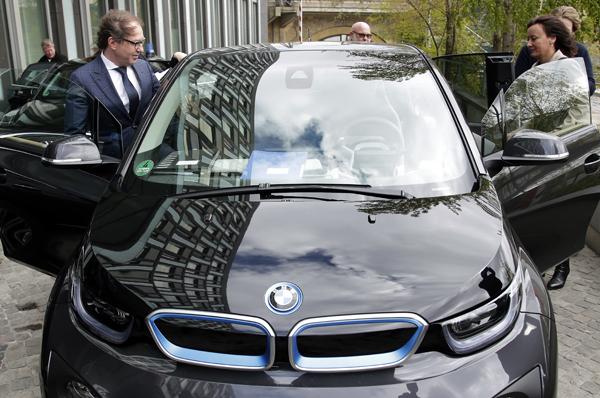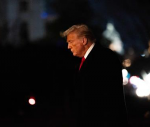You are here
China, Europe drive shift to electric cars as US lags
By Reuters - Jan 15,2017 - Last updated at Jan 15,2017

In this January 9 photo, Herbert Diess, chairman of the Volkswagen brand, poses with the I.D. Buzz all-electric concept van, at the North American International Auto Show, in Detroit (AP photo)
DETROIT — Electric cars will pick up critical momentum in 2017, many in the auto industry believe — just not in North America.
Tighter emissions rules in China and Europe leave global carmakers and some consumers with little choice but to embrace plug-in vehicles, fuelling an investment surge, said industry executives gathered in Detroit this past week for the city's annual auto show.
"Car electrification is an irreversible trend," said Jacques Aschenbroich, chief executive of auto supplier Valeo, which has expanded sales by 50 per cent in five years with a focus on electric, hybrid, connected and self-driving cars.
In Europe, green cars benefit increasingly from subsidies, tax breaks and other perks, while combustion engines face mounting penalties, including driving and parking restrictions.
China, struggling with catastrophic pollution levels in major cities, is aggressively pushing plug-in vehicles. Its carrot-and-stick approach combines tens of billions in investment and research funding with subsidies, and regulations designed to discourage driving fossil-fuelled cars in big cities.
The road ahead for electric vehicles (EVs) in the United States, however, could have more hairpin curves.
Regulators in California and a group of other US states are pushing ahead with state-level rules mandating rising quotas for electric, or "zero emission" vehicles.
But plug-in registrations in the United States fell in 2015, and the market share of electric-only vehicles declined further to 0.37 per cent in 2016, as cheap fuel drove demand for gas-guzzling sport utility vehicles and pickup trucks.
President-elect Donald Trump has pledged to roll back environmental and climate rules. Groups representing established automakers asked Trump to review Obama administration fuel economy targets out to 2025, even before the outgoing administration formally signed them into effect on Friday.
Automakers have also asked Trump to work towards a single, national set of rules to govern automotive greenhouse gas emissions, a move that could spark legal challenges to electric car quotas in California and other states on grounds they present a separate standard.
’The world
is going electric’
Still, industry executives in Detroit said hitting the brakes on electric vehicles in the United States would not relieve the pressure to bring them to market, because China and Europe are forging ahead with policies to expand sales of plug-in cars.
That is why Ford is moving forward with previously announced plans to invest $4.5 billion for plug-in vehicles by 2020, Chief Executive Mark Fields said earlier this month.
"The industry is changing, the infrastructure's starting to build, and that's why our view is [that] within the next 15 years we'll see more electrified offerings than we'll see gasoline-powered," Fields said as he unveiled a $700 million plan to build a battery SUV and other plug-in vehicles in Flat Rock, Michigan.
To drive the shift to electric, industry executives said they needed more help from governments.
In China, Europe and the United States, automakers are advocating new infrastructure money go to public electric car charging networks.
In the United States, EV manufacturers are pushing for the continuation of a $7,500 federal tax subsidy for consumers who buy a fully electric car. Even if Trump were to try to eliminate it, it would take time as Congress would have to act.
"There is not a disagreement that the world is going electric," California Air Resources Board Chair Mary Nichols said on the sidelines of the auto show, noting that all vehicle makers were now investing in electric models across their entire product lines. The debate, she said, was "over timing, not the goal”.
The Chinese electric car market cast its shadow over the Detroit auto show, where manufacturers showed off plug-in hybrid and electric models that will likely do scant business in the United States.
IHS Automotive predicts Chinese plug-in deliveries will hit 1 million in 2019, four years before the United States. China pulled ahead in 2015 with a fourfold sales surge before adding 55 per cent last year to 348,000 vehicles, with the United States at 138,000.
"Look to China rather than the US for the future of electric cars," Gerard Detourbet, a Renault-Nissan executive leading low-cost plug-in development, said recently. "China is compelled to act — that's the main difference."
Related Articles
NEW YORK — The world's top automakers — motivated either by governmental regulations or pure profit — have made a sharp turn away from fossi
BERLIN — Germany's auto industry risks being overtaken by foreign competitors unless it receives greater domestic support, the country's eco
The next-generation of the Chevrolet Volt, one of the first plug-in cars of the modern age, will get a load of new technology and will make its world debut in January at the North American International Auto Show in Detroit, says Tim Mahoney, chief marketing officer for Chevrolet,
















